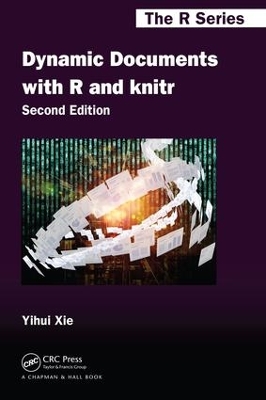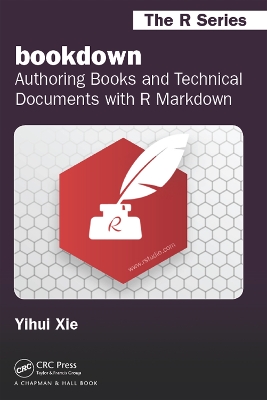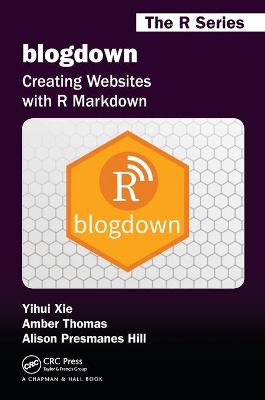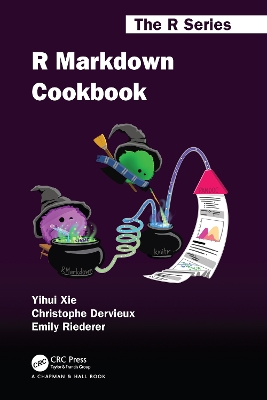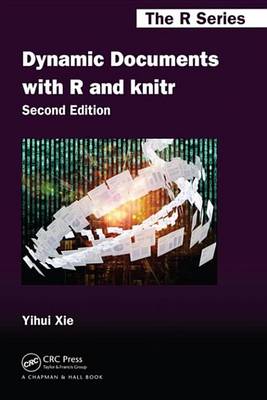Chapman & Hall/CRC The R
6 total works
Quickly and Easily Write Dynamic Documents
Suitable for both beginners and advanced users, Dynamic Documents with R and knitr, Second Edition makes writing statistical reports easier by integrating computing directly with reporting. Reports range from homework, projects, exams, books, blogs, and web pages to virtually any documents related to statistical graphics, computing, and data analysis. The book covers basic applications for beginners while guiding power users in understanding the extensibility of the knitr package.
New to the Second Edition
- A new chapter that introduces R Markdown v2
- Changes that reflect improvements in the knitr package
- New sections on generating tables, defining custom printing methods for objects in code chunks, the C/Fortran engines, the Stan engine, running engines in a persistent session, and starting a local server to serve dynamic documents
Boost Your Productivity in Statistical Report Writing and Make Your Scientific Computing with R Reproducible
Like its highly praised predecessor, this edition shows you how to improve your efficiency in writing reports. The book takes you from program output to publication-quality reports, helping you fine-tune every aspect of your report.
bookdown: Authoring Books and Technical Documents with R Markdown presents a much easier way to write books and technical publications than traditional tools such as LaTeX and Word. The bookdown package inherits the simplicity of syntax and flexibility for data analysis from R Markdown, and extends R Markdown for technical writing, so that you can make better use of document elements such as figures, tables, equations, theorems, citations, and references. Similar to LaTeX, you can number and cross-reference these elements with bookdown. Your document can even include live examples so readers can interact with them while reading the book. The book can be rendered to multiple output formats, including LaTeX/PDF, HTML, EPUB, and Word, thus making it easy to put your documents online. The style and theme of these output formats can be customized.
We used books and R primarily for examples in this book, but bookdown is not only for books or R. Most features introduced in this book also apply to other types of publications: journal papers, reports, dissertations, course handouts, study notes, and even novels. You do not have to use R, either. Other choices of computing languages include Python, C, C++, SQL, Bash, Stan, JavaScript, and so on, although R is best supported. You can also leave out computing, for example, to write a fiction. This book itself is an example of publishing with bookdown and R Markdown, and its source is fully available on GitHub.
blogdown: Creating Websites with R Markdown provides a practical guide for creating websites using the blogdown package in R. In this book, we show you how to use dynamic R Markdown documents to build static websites featuring R code (or other programming languages) with automatically rendered output such as graphics, tables, analysis results, and HTML widgets. The blogdown package is also suitable for technical writing with elements such as citations, footnotes, and LaTeX math. This makes blogdown an ideal platform for any website designed to communicate information about data science, data analysis, data visualization, or R programming.
Note that blogdown is not just for blogging or sites about R; it can also be used to create general-purpose websites. By default, blogdown uses Hugo, a popular open-source static website generator, which provides a fast and flexible way to build your site content to be shared online. Other website generators like Jekyll and Hexo are also supported.
In this book, you will learn how to:
- Build a website using the blogdown package;
- Create blog posts and other website content as dynamic documents that can be easily edited and updated;
- Customize Hugo templates to suit your site’s needs;
- Publish your website online;
- Migrate your existing websites to blogdown and Hugo.
This new book written by the developers of R Markdown is an essential reference that will help users learn and make full use of the software.
Those new to R Markdown will appreciate the short, practical examples that address the most common issues users encounter. Frequent users will also benefit from the wide ranging tips and tricks that expose ‘hidden’ features, support customization and demonstrate the many new and varied applications of the software.
After reading this book users will learn how to:
- Enhance your R Markdown content with diagrams, citations, and dynamically generated text
- Streamline your workflow with child documents, code chunk references, and caching
- Control the formatting and layout with Pandoc markdown syntax or by writing custom HTML and LaTeX templates
- Utilize chunk options and hooks to fine-tune how your code is processed
- Switch between different language engineers to seamlessly incorporate python, D3, and more into your analysis
Quickly and Easily Write Dynamic Documents
Suitable for both beginners and advanced users, Dynamic Documents with R and knitr, Second Edition makes writing statistical reports easier by integrating computing directly with reporting. Reports range from homework, projects, exams, books, blogs, and web pages to virtually any documents related to statistical graphics, computing, and data analysis. The book covers basic applications for beginners while guiding power users in understanding the extensibility of the knitr package.
New to the Second Edition
- A new chapter that introduces R Markdown v2
- Changes that reflect improvements in the knitr package
- New sections on generating tables, defining custom printing methods for objects in code chunks, the C/Fortran engines, the Stan engine, running engines in a persistent session, and starting a local server to serve dynamic documents
Boost Your Productivity in Statistical Report Writing and Make Your Scientific Computing with R Reproducible
Like its highly praised predecessor, this edition shows you how to improve your efficiency in writing reports. The book takes you from program output to publication-quality reports, helping you fine-tune every aspect of your report.
R Markdown: The Definitive Guide is the first official book authored by the core R Markdown developers that provides a comprehensive and accurate reference to the R Markdown ecosystem. With R Markdown, you can easily create reproducible data analysis reports, presentations, dashboards, interactive applications, books, dissertations, websites, and journal articles, while enjoying the simplicity of Markdown and the great power of R and other languages.
In this book, you will learn
- Basics: Syntax of Markdown and R code chunks, how to generate figures and tables, and how to use other computing languages
- Built-in output formats of R Markdown: PDF/HTML/Word/RTF/Markdown documents and ioslides/Slidy/Beamer/PowerPoint presentations
- Extensions and applications: Dashboards, Tufte handouts, xaringan/reveal.js presentations, websites, books, journal articles, and interactive tutorials
- Advanced topics: Parameterized reports, HTML widgets, document templates, custom output formats, and Shiny documents.
Yihui Xie is a software engineer at RStudio. He has authored and co-authored several R packages, including knitr, rmarkdown, bookdown, blogdown, shiny, xaringan, and animation. He has published three other books, Dynamic Documents with R and knitr, bookdown: Authoring Books and Technical Documents with R Markdown, and blogdown: Creating Websites with R Markdown.
J.J. Allaire is the founder of RStudio and the creator of the RStudio IDE. He is an author of several packages in the R Markdown ecosystem including rmarkdown, flexdashboard, learnr, and radix.
Garrett Grolemund is the co-author of R for Data Science and author of Hands-On Programming with R. He wrote the lubridate R package and works for RStudio as an advocate who trains engineers to do data science with R and the Tidyverse.
